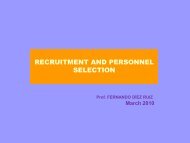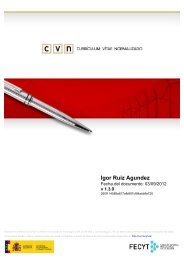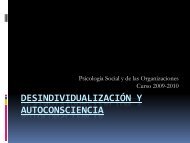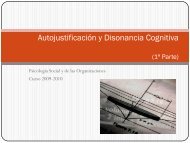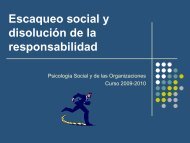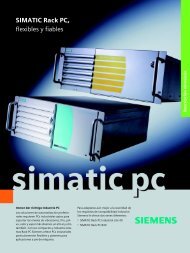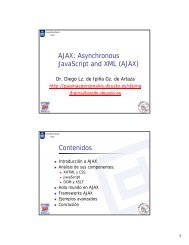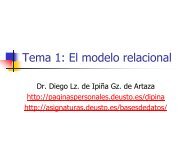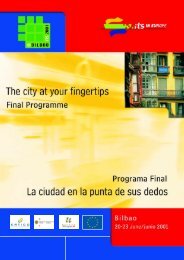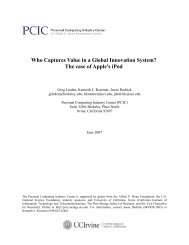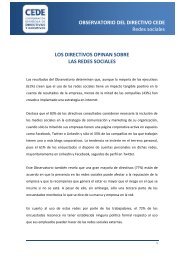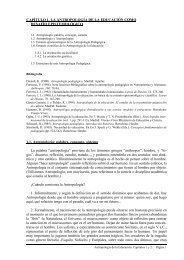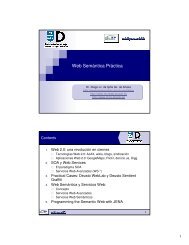MIGUEL A. VADILLO - Universidad de Deusto
MIGUEL A. VADILLO - Universidad de Deusto
MIGUEL A. VADILLO - Universidad de Deusto
You also want an ePaper? Increase the reach of your titles
YUMPU automatically turns print PDFs into web optimized ePapers that Google loves.
<strong>MIGUEL</strong> A. <strong>VADILLO</strong><br />
UNIVERSIDAD DE DEUSTO, FACULTAD DE PSICOLOGÍA Y EDUCACIÓN<br />
DPTO. DE FUNDAMENTOS Y MÉTODOS DE LA PSICOLOGÍA, APDO. 1, 48080, BILBAO, SPAIN<br />
TEL. (0034) 944139000 (EXT. 2625), mvadillo@<strong>de</strong>usto.es, web: http://mvadillo.com<br />
FORMACIÓN ACADÉMICA<br />
__________________________________________________________________________________________________________<br />
2001 Licenciado en Psicología, con grado <strong>de</strong> matrícula <strong>de</strong> honor<br />
<strong>Universidad</strong> <strong>de</strong> <strong>Deusto</strong>, Bilbao<br />
2003 Diploma <strong>de</strong> estudios avanzados<br />
<strong>Universidad</strong> <strong>de</strong> <strong>Deusto</strong>, Bilbao<br />
2005 Doctor en Psicología, cum lau<strong>de</strong> por unanimidad<br />
<strong>Universidad</strong> <strong>de</strong> <strong>Deusto</strong>, Bilbao<br />
2008 Licenciado en Antropología Social y Cultural<br />
<strong>Universidad</strong> Nacional <strong>de</strong> Educación a Distancia, Madrid<br />
Estudios inacabados <strong>de</strong> Filosofía y Economía<br />
<strong>Universidad</strong> Nacional <strong>de</strong> Educación a Distancia, Madrid<br />
EXPERIENCIA PROFESIONAL<br />
__________________________________________________________________________________________________________<br />
2001-2005 Becario FPI <strong>de</strong>l Gobierno Vasco (Beca BFI01.031)<br />
<strong>Universidad</strong> <strong>de</strong> <strong>Deusto</strong>, Bilbao<br />
2004, Jun-Ago Invited scholar<br />
State University of New York at Binghamton, NY, EE.UU.<br />
2005-2010 Profesor contratado doctor con <strong>de</strong>dicación plena (80%)<br />
<strong>Universidad</strong> <strong>de</strong> <strong>Deusto</strong>, Bilbao<br />
2010-2012 Profesor contratado doctor con <strong>de</strong>dicación exclusiva<br />
<strong>Universidad</strong> <strong>de</strong> <strong>Deusto</strong>, Bilbao<br />
2011, Febr-Sept Senior FWO-postdoctoral fellow<br />
Universiteit Gent, Flan<strong>de</strong>s, Bélgica<br />
2012, Sept… ESRC Research associate<br />
University College London, Londres, Inglaterra<br />
PREMIOS Y MENCIONES<br />
__________________________________________________________________________________________________________<br />
2006 Miembro <strong>de</strong>l equipo ganador <strong>de</strong>l II Premio UD-Grupo Santan<strong>de</strong>r<br />
2007 Mención honorífica en el II Premio Panhispánico <strong>de</strong> Traducción Especializada<br />
por la traducción al castellano <strong>de</strong> The principles of learning and behavior (Domjan, 2003)<br />
Fundación Española para la Ciencia y la Tecnología & Unión Latina<br />
Otorgada en el IV Congreso Internacional <strong>de</strong> la Lengua Española, Cartagena <strong>de</strong> Indias<br />
PROYECTOS DE I+D Y OTRAS FUENTES DE FINANCIACIÓN<br />
__________________________________________________________________________________________________________<br />
2002-2004 Proyecto: Generalidad <strong>de</strong>l aprendizaje asociativo (PI-2000-12)<br />
Dpto. Educación, <strong>Universidad</strong>es e Investigación, Gobierno Vasco<br />
Cuantía: 56.811,12 €<br />
IP: Helena Matute, <strong>Universidad</strong> <strong>de</strong> <strong>Deusto</strong><br />
Actualizado: 12/06/2012 1
01/01/2006-01/01/2009 Proyecto: Procesos <strong>de</strong> inferencia causal en situaciones <strong>de</strong> incertidumbre (SEJ406)<br />
Secretaría General <strong>de</strong> <strong>Universidad</strong>es, Investigación y Tecnología, Junta <strong>de</strong> Andalucía<br />
Cuantía: 134.500 €<br />
IP: Francisco José López, <strong>Universidad</strong> <strong>de</strong> Málaga<br />
01/12/2007-31/11/2010 Proyecto: Aprendizaje causal: Teoría, método y aplicaciones (SEJ2007-63691/PSIC)<br />
Dirección General <strong>de</strong> Investigación, Ministerio <strong>de</strong> Educación y Ciencia<br />
Cuantía: 91.800 €<br />
IP: Helena Matute, <strong>Universidad</strong> <strong>de</strong> <strong>Deusto</strong><br />
01/01/2008-31/12/2009 Ayudas para apoyar las activida<strong>de</strong>s <strong>de</strong> los grupos <strong>de</strong> investigación (IT-198-07)<br />
Dpto. <strong>de</strong> Educación, <strong>Universidad</strong>es e Investigación, Gobierno Vasco<br />
Cuantía: 43.264,10 €<br />
Reconocimiento como Equipo B<br />
01/01/2008-31/12/2010 Proyecto: Aprendizaje causal: Teoría, método y aplicaciones (PI2008-9)<br />
Dpto. Educación, <strong>Universidad</strong>es e Investigación, Gobierno Vasco<br />
Cuantía: 8.500 €<br />
IP: Helena Matute, <strong>Universidad</strong> <strong>de</strong> <strong>Deusto</strong><br />
30/06/2008-31/12/2008 Proyecto: psikolab.com, laboratorio virtual accesible <strong>de</strong> psicología (IKT-2008C0/0013)<br />
Dpto. Cultura, Gobierno Vasco<br />
Cuantía: 18.440 €<br />
IP: Helena Matute, <strong>Universidad</strong> <strong>de</strong> <strong>Deusto</strong><br />
2009-13/01/2013 Proyecto: Diagnóstico y acción en situaciones inciertas (P08-SEJ-03586)<br />
Consejería <strong>de</strong> Innovación, Ciencia y Empresa, Junta <strong>de</strong> Andalucía<br />
Cuantía: 236.845,68 €<br />
IP: Francisco José López, <strong>Universidad</strong> <strong>de</strong> Málaga<br />
01/01/2010-31/12/2015 Ayudas para apoyar las activida<strong>de</strong>s <strong>de</strong> los grupos <strong>de</strong> investigación (IT363-10)<br />
Dpto. <strong>de</strong> Educación, <strong>Universidad</strong>es e Investigación, Gobierno Vasco<br />
Cuantía: 166.000 €<br />
Reconocimiento como Equipo A<br />
2011-2014 Proyecto: Utilización <strong>de</strong> la investigación sobre aprendizaje causal para<br />
reducir el impacto <strong>de</strong> las pseudociencias (PSI2011-26965)<br />
Dirección General <strong>de</strong> Investigación y Gestión <strong>de</strong>l Plan Nacional <strong>de</strong> I+D+i<br />
Ministerio <strong>de</strong> Economía y Competitividad<br />
Cuantía: 112.000 €<br />
IP: Helena Matute, <strong>Universidad</strong> <strong>de</strong> <strong>Deusto</strong><br />
2012-2014 Proyecto: Test <strong>de</strong> Asociación Implícita: Avances metodológicos y nuevas aplicaciones (PI2012-56)<br />
Dpto. <strong>de</strong> Educación, <strong>Universidad</strong>es e Investigación, Gobierno Vasco<br />
Cuantía: 50.250 €<br />
IP: Miguel A. Vadillo, <strong>Universidad</strong> <strong>de</strong> <strong>Deusto</strong><br />
2012-2014 Proyecto: Bloqueo hacia atrás en el aprendizaje <strong>de</strong> asociaciones en humanos (P11-SEJ-7898)<br />
Consejería <strong>de</strong> Innovación, Ciencia y Empresa, Junta <strong>de</strong> Andalucía<br />
Cuantía: 11.000 €<br />
IP: David Luque, <strong>Universidad</strong> <strong>de</strong> Málaga<br />
LIBROS ESCRITOS Y EDITADOS<br />
__________________________________________________________________________________________________________<br />
1. Matute, H., Vadillo, M. A., Blanco, F., Orgaz, C., & Vegas, S. (Eds.) (2007). En qué se diferencia la danza <strong>de</strong> la<br />
lluvia <strong>de</strong>l barómetro y <strong>de</strong> las bajas presiones. Bilbao: <strong>Universidad</strong> <strong>de</strong> <strong>Deusto</strong>. [ISBN: 978-84-9830-116-8]<br />
2. Pineño, O., Vadillo, M. A., & H. Matute (Eds.) (2007). Psicología <strong>de</strong>l aprendizaje. Badajoz: Abecedario. [ISBN:<br />
978-84-96560-40-6]<br />
3. Orgaz, C., Blanco, F., Yarritu, I., Vadillo, M. A., & Matute, H. (Eds.) (2008). Libro <strong>de</strong> resúmenes <strong>de</strong>l XX Congreso<br />
<strong>de</strong> la Sociedad Española <strong>de</strong> Psicología Comparada. Bilbao: Sociedad Española <strong>de</strong> Psicología Comparada. [ISBN:<br />
978-84-612-5892-5]<br />
4. Matute, H., & Vadillo, M. A. (2012). Psicología <strong>de</strong> las nuevas tecnologías: De la adicción a Internet a la convivencia<br />
con robots. Madrid: Editorial Síntesis. [ISBN: 978-84-975637-6-5]<br />
Actualizado: 12/06/2012 2
ARTÍCULOS EN REVISTAS INDEXADAS EN EL JCR<br />
ResearcherID profile: http://www.researcherid.com/rid/A-8702-2011<br />
__________________________________________________________________________________________________________<br />
1. Vadillo, M. A., Vegas, S., & Matute, H. (2004). Frequency of judgment as a context-like <strong>de</strong>terminant of<br />
predictive judgments. Memory & Cognition, 32, 1065-1075. [IF 2004 = 1.409; Journal ranking 2004: Psychology,<br />
Experimental 35/68, Q3; Times cited = 9]<br />
2. Vadillo, M. A., Miller, R. R., & Matute, H. (2005). Causal and predictive-value judgments, but not predictions,<br />
are based on cue-outcome contingency. Learning & Behavior, 33, 172-183. [IF 2005 = 1.408; Journal ranking<br />
2005: Psychology, Biological = 10/15 Q3, Psychology, Experimental = 37/68, Q3; Times cited = 21; quinto<br />
artículo más citado <strong>de</strong> los 39 que component su volumen.]<br />
3. Lipatova, O., Wheeler, D., Vadillo, M. A., & Miller, R. R. (2006). Recency-to-primacy shift in cue competition.<br />
Journal of Experimental Psychology: Animal Behavior Processes, 32, 396-406. doi: 10.1037/0097-7403.32.4.396 [IF<br />
2006 = 2.153; Journal ranking 2006: Psychology, Biological = 8/15 Q3, Psychology, Experimental = 25/70, Q2;<br />
Times cited = 5]<br />
4. Vadillo, M. A., Bárcena, R., & Matute, H. (2006). The internet as a research tool in the study of associative<br />
learning: An example from overshadowing. Behavioural Processes, 73, 36-40. doi: 10.1016/j.beproc.2006.01.014<br />
[IF 2006 = 1.478; Journal ranking 2006: Psychology, Biological = 13/15 Q4; Times cited = 8]<br />
5. Matute, H., Vadillo, M. A., Vegas, S., & Blanco, F. (2007). Illusion of control in Internet users and college<br />
stu<strong>de</strong>nts. CyberPsychology & Behavior, 10, 176-181. doi: 10.1089/cpb.2006.9971 [IF 2007 = 1.368; Journal ranking<br />
2007: Communication = 10/45 Q1, Psychology, Applied = 22/57, Q2; Times cited = 10; También citado en<br />
diversos libros internacionales: e.g., Evans, 2010; Austin, 2010]<br />
6. Matute, H., Vadillo, M. A., & Bárcena, R. (2007). Web-based experiment control software for research and<br />
teaching on human learning. Behavior Research Methods, 39, 689-693. [IF 2007 = 0.963; Journal ranking 2007:<br />
Psychology, Experimental = 57/72 Q4, Psychology, Mathematical = 3/10, Q2; Times cited = 4]<br />
7. Vadillo, M. A., & Matute, H. (2007). Predictions and causal estimations are not supported by the same<br />
associative structure. Quarterly Journal of Experimental Psychology, 60, 433-447. doi: 10.1080/17470210601002520<br />
[IF 2007 = 1.104; Journal ranking 2007: Psychology, Experimental = 52/72 Q3; Times cited = 22; Quinto<br />
artículo más citado <strong>de</strong> los 118 que component su volumen.]<br />
8. Vadillo, M. A., Castro, L., Matute, H., & Wasserman, E. A. (2008). Backward blocking: The role of withincompound<br />
associations and interference between cues trained apart. Quarterly Journal of Experimental<br />
Psychology, 61, 185-193. doi: 10.1080/17470210701557464 [IF 2008 = 1.760; Journal ranking 2008: Psychology,<br />
Experimental = 31/71 Q2; Times cited = 5]<br />
9. Vadillo, M. A., Orgaz, C., & Matute, H. (2008). Overshadowed cues have reduced ability to retroactively<br />
interfere with other cues. Learning and Motivation, 39, 313-322. doi: 10.1016/j.lmot.2008.05.005 [IF 2008 = 0.857;<br />
Journal ranking 2008: Psychology, Biological = 12/14 Q4, Psychology, Experimental = 61/71 Q4]<br />
10. Blanco, F., Matute, H., & Vadillo, M. A. (2009). Depressive realism: Wiser or quieter Psychological Record, 59,<br />
551-562. [IF 2009 = 0.653; Journal ranking 2009: Psychology, Multidisciplinary = 68/111 Q3; Times cited = 2]<br />
11. Matute, H., & Vadillo, M. A. (2009). The Proust effect and the evolution of a dual learning system. Behavioral<br />
and Brain Sciences, 32, 215-216. doi: 10.1017/S0140525X09001046 [IF 2009 = 19.045; Journal ranking 2009:<br />
Psychology, Biological = 1/14 Q1]<br />
12. Vadillo, M. A., & Matute, H. (2009). Learning in virtual environments: Some discrepancies between<br />
laboratory- and Internet-based research on associative learning. Computers in Human Behavior, 25, 402-406. doi:<br />
10.1016/j.chb.2008.08.009 [IF 2009 = 1.677; Journal ranking 2009: Psychology, Experimental = 38/73 Q3,<br />
Psychology, Multidisciplinary = 32/111 Q2; Times cited = 1]<br />
13. Blanco, F., Matute, H., & Vadillo, M. A. (2010). Contingency is used to prepare for outcomes: Implications for<br />
a functional analysis of learning. Psychonomic Bulletin & Review, 17, 117-121. doi: 10.3758/PBR.17.1.117 [IF 2010<br />
= 2.283; Journal ranking 2010: Psychology, Experimental = 23/81 Q2, Psychology, Mathematical = 2/11 Q1;<br />
Times cited = 1]<br />
14. Musca, S. C., Vadillo, M. A., Blanco, F., & Matute, H. (2010). The role of cue information in the outcome<strong>de</strong>nsity<br />
effect: Evi<strong>de</strong>nce from neural network simulations and a causal learning experiment. Connection<br />
Science, 20, 177-192. doi: 10.1080/09540091003623797 [IF 2010 = 1.057; Journal ranking 2010: Computer<br />
Science, Artificial Intelligence = 68/108 Q3, Computer Science, Theory & Methods = 47/97 Q2; Times cited =<br />
1]<br />
Actualizado: 12/06/2012 3
15. Vadillo, M. A., & Matute, H. (2010). Augmentation in contingency learning un<strong>de</strong>r time pressure. British<br />
Journal of Psychology, 101, 579-589. doi: 10.1348/000712609X477566 [IF 2010 = 2.172; Journal ranking 2010:<br />
Psychology, Multidisciplinary = 16/120 Q1; Times cited = 1]<br />
16. Blanco, F., Matute, H., & Vadillo, M. A. (2011). Making the uncontrollable seem controllable: The role of action<br />
in the illusion of control. Quarterly Journal of Experimental Psychology, 64, 1290-1304.<br />
doi:10.1080/17470218.2011.552727 [IF 2010 = 2.212; Journal ranking 2010: Psychology, Experimental = 27/81<br />
Q2; Times cited = 1]<br />
17. Luque, D., & Vadillo, M. A. (2011). Backward versus forward blocking: Evi<strong>de</strong>nce for performance-based<br />
mo<strong>de</strong>ls of human contingency learning. Psychological Reports, 109, 1001-1016. doi:<br />
10.2466/22.23.PR0.109.6.1001-1016 [IF 2010 = 0.439; Journal ranking 2010: Psychology, Multidisciplinary =<br />
96/120 Q4]<br />
18. Matute, H., Lipp, O. V., Vadillo, M. A., & Humphreys, M. S. (2011). Temporal contexts: Filling the gap<br />
between episodic memory and associative learning. Journal of Experimental Psychology: General, 140, 660-673.<br />
doi: 10.1037/a0023862 [IF 2010 = 5.042; Journal ranking 2010: Psychology, Experimental = 4/81 Q1]<br />
19. Matute, H., Yarritu, I., & Vadillo, M. A. (2011). Illusions of causality at the heart of pseudoscience. British<br />
Journal of Psychology, 102, 392-405. [IF 2010 = 2.172; Journal ranking 2010: Psychology, Multidisciplinary =<br />
16/120 Q1; Times cited = 2]<br />
20. Vadillo, M. A., & Matute, H. (2011). Further evi<strong>de</strong>nce on the validity of web-based research on associative<br />
learning: Augmentation in a predictive learning task. Computers in Human Behavior, 27, 750-754. doi:<br />
10.1016/j.chb.2010.10.020 [IF 2010 = 1.865; Journal ranking 2010: Psychology, Experimental = 37/81 Q2,<br />
Psychology, Multidisciplinary = 26/110 Q1; Times cited = 1]<br />
21. Vadillo, M. A., Musca, S. C., Blanco, F., & Matute, H. (2011). Contrasting cue <strong>de</strong>nsity effects in causal and<br />
prediction judgments. Psychonomic Bulletin & Review, 18, 110-115. doi: 10.3758/s13423-010-0032-2 [IF 2010 =<br />
2.283; Journal ranking 2010: Psychology, Experimental = 23/81 Q2, Psychology, Mathematical = 2/11 Q1;<br />
Times cited = 1]<br />
22. Luque, D., Flores, A., & Vadillo, M. A. (in press). Revisiting the role of within-compound associations in cueinteraction<br />
phenomena. Learning & Behavior. [IF 2010 = 1.603; Journal ranking 2010: Psychology, Biological =<br />
9/14 Q3, Psychology, Experimental = 49/81 Q3]<br />
23. Vadillo, M. A., & Luque, D. (in press). Dissociations among judgments do not reflect cognitive priority: An<br />
associative explanation of memory for frequency information in contingency learning. Canadian Journal of<br />
Experimental Psychology. [IF 2010 = 1.177; Journal ranking 2010: Psychology, Experimental = 62/81 Q4]<br />
24. Vadillo, M. A., Matute, H., & Blanco, F. (in press). Fighting the illusion of control: How to make use of cue<br />
competition and alternative explanations. Universitas Psychologica. [IF 2010 = 1.283; Journal ranking 2010:<br />
Psychology, Multidisciplinary = 51/120 Q2]<br />
25. Vadillo, M. A., Orgaz, C., Luque, D., Cobos, P. L., López, F. J., & Matute, H. (in press). The role of outcome<br />
inhibition in interference between outcomes: A contingency-learning analogue of retrieval-induced forgetting.<br />
British Journal of Psychology. [IF 2010 = 2.172; Journal ranking 2010: Psychology, Multidisciplinary = 16/120<br />
Q1]<br />
ARTÍCULOS EN REVISTAS NO INDEXADAS EN EL JCR<br />
__________________________________________________________________________________________________________<br />
1. Orgaz, C., Luque, D., Vadillo, M. A., López, F. J., & Matute, H. (2008). La interferencia retroactiva entre claves<br />
entrenadas por separado: Evi<strong>de</strong>ncia empírica y enfoques teóricos. Escritos <strong>de</strong> Psicología, 2, 85-96. [Revista<br />
nacional in<strong>de</strong>xada en el IN-RECS]<br />
2. Garaizar, P., Vadillo, M. A., & Matute, H. (2010). ¿Pue<strong>de</strong> la web social emplearse como plataforma <strong>de</strong> e-<br />
learning para el aprendizaje colaborativo Notas: Boletín Electrónico <strong>de</strong> Investigación <strong>de</strong> la Asociación Oaxaqueña<br />
<strong>de</strong> Psicología, 6(2), 127-135.<br />
CAPÍTULOS DE LIBRO Y PROCEEDINGS<br />
__________________________________________________________________________________________________________<br />
1. Vadillo, M. A., & Matute, H. (2005). Nuevas perspectivas teóricas para el estudio <strong>de</strong> la extinción en juicios <strong>de</strong><br />
causalidad. En N. J. Vila & J. M. Rosas (Eds.), Aprendizaje causal y recuperación <strong>de</strong> la información: Perspectivas<br />
teóricas (pp. 31-46). Jaén: Del Lunar. [ISBN: 84-95331-29-2]<br />
Actualizado: 12/06/2012 4
2. Matute, H., & Vadillo, M. A. (2007). Assessing e-learning in web labs. In L. Gomes & J. García-Zubía (Eds.),<br />
Advances on remote laboratories and e-learning experiences (pp. 97-107). Bilbao, Spain: University of <strong>Deusto</strong>.<br />
[ISBN: 978-84-9830-077-2]<br />
3. Matute, H., Vadillo, M. A., Blanco, F., & Musca, S. C. (2007). Either greedy or well informed: The reward<br />
maximization - unbiased evaluation tra<strong>de</strong>-off. In S. Vosniadou, D. Kayser, & A. Protopapas (Eds.), Proceedings<br />
of the European Cognitive Science Conference (pp. 341-346). Hove, UK: Erlbaum. [ISBN: 978-1-84169-696-6]<br />
4. Vadillo, M. A., & Matute, H. (2007). Introducción al aprendizaje causal. En O. Pineño, M. A. Vadillo, & H.<br />
Matute (Eds.), Psicología <strong>de</strong>l aprendizaje (pp. 301-322). Badajoz: Abecedario. [ISBN: 978-84-96560-40-6]<br />
5. Blanco, F., Vadillo, M. A., & Matute, H. (2008). La pasividad <strong>de</strong> los <strong>de</strong>presivos les protege <strong>de</strong> la ilusión <strong>de</strong><br />
control. En I. Etxebarria, A. Aritzeta, E. Barberá, M. Chóliz, M. P. Jiménez, F. Martínez-Sánchez, P. M. Mateos,<br />
& D. Páez (Eds.), Emoción y motivación: Contribuciones actuales (Vol. 2, Motivación, pp. 79-90). San Sebastián:<br />
Asociación <strong>de</strong> Motivación y Emoción. [ISBN: 978-84-691-1426-1]<br />
6. Musca, S. C., Vadillo, M. A., Blanco, F., & Matute, H. (2008). Associative and connectionist accounts of biased<br />
contingency <strong>de</strong>tection in humans. In R. M. French & E. Thomas (Eds.), From associations to rules: Connectionist<br />
mo<strong>de</strong>ls of behavior and cognition (pp. 16-27). Singapore: World Scientific. [ISBN: 978-981-279-731-5]<br />
7. Garaizar, P., Vadillo, M. A., López-<strong>de</strong>-Ipiña, D., & Matute, H. (2012). The web as a platform for e-research in<br />
psychology. In A. Juan, T. Daradoumis, M. Roca, S. E. Grasman, & J. Faulin (Eds.), Collaborative and distributed<br />
e-research: Innovations in technologies, strategies and applications (pp. 34-61). Hershey, PA: IGI Global. DOI:<br />
10.4018/978-1-4666-0125-3.ch002 [ISBN 978-1-4666-0125-3]<br />
8. Matute, H., & Vadillo, M. A. (2012). Causal learning & illusions of control. In N. M. Seel (Ed.), Encyclopedia of<br />
the sciences of learning: SpringerReference (www.springerreference.com). Berlin, Hei<strong>de</strong>lberg: Springer Verlag.<br />
9. Matute, H., Vadillo, M. A., & Garaizar, P. (2012). Web-based experiment control software for research on<br />
human learning. In N. M. Seel (Ed.), Encyclopedia of the sciences of learning: SpringerReference<br />
(www.springerreference.com). Berlin, Hei<strong>de</strong>lberg: Springer Verlag.<br />
TRADUCCIONES DE LIBROS<br />
__________________________________________________________________________________________________________<br />
1. Domjan, M. (2004). Principios <strong>de</strong> aprendizaje y conducta (5ª Edición). Madrid: Thomson-Paraninfo. [ISBN: 84-<br />
9732-208-8, Traductor <strong>de</strong> los capítulos 1-4, 11 y 12]<br />
CHARLAS Y SEMINARIOS<br />
__________________________________________________________________________________________________________<br />
1. Vadillo, M. A. (2011, March). From Plato to Orwell: Why people believe the unbelievable. Invited talk at the<br />
Department of Experimental Clinical and Health Psychology, Universiteit Gent, Belgium.<br />
2. Vadillo, M. A. (2011, May). Beyond rationality: Un<strong>de</strong>rstanding the cognitive roots of superstition and pseudoscience.<br />
Invited talk at the Centre for the Psychology of Learning and Experimental Psychopathology, Katholieke<br />
Universiteit Leuven, Belgium.<br />
3. Vadillo, M. A. (2012, Marzo). ¿Ángeles platónicos o criaturas orwellianas Hacia una psicología cognitiva <strong>de</strong> los<br />
errores <strong>de</strong> atribución causal. Conferencia invitada en el III Ciclo <strong>de</strong> Conferencias <strong>de</strong> Psicología <strong>de</strong> la Facultad <strong>de</strong><br />
Ciencias Sociales y Humanas <strong>de</strong> la <strong>Universidad</strong> <strong>de</strong> Zaragoza, Campus <strong>de</strong> Teruel.<br />
4. Vadillo, M. A. (2012, Julio). Aprendizaje y argumentación. Taller en el curso Argumentación (ética) y pensamiento<br />
crítico: Argumentación en ética aplicada a los profesionales, organizado por el Centro <strong>de</strong> Ética Aplicada <strong>de</strong> la<br />
<strong>Universidad</strong> <strong>de</strong> <strong>Deusto</strong>, Bilbao.<br />
PONENCIAS INVITADAS EN CONGRESOS<br />
__________________________________________________________________________________________________________<br />
5. Vadillo, M. A., Vegas, S., & Matute, H. (2003, Septiembre). La frecuencia con que se emiten los juicios no afecta al<br />
contenido <strong>de</strong>l aprendizaje sino a la respuesta. Simposio por invitación Extinción y recuperación <strong>de</strong> la información en<br />
aprendizaje causal: Perspectivas teóricas organizado por J. N. Vila. XV Congreso <strong>de</strong> la Sociedad Española <strong>de</strong><br />
Psicología Comparada. Barcelona.<br />
6. Matute, H., & Vadillo, M. A. (2004, Mayo). Extending associative and statistical mo<strong>de</strong>ls of predictive and causal<br />
learning. Paper presented at the Special Interest Meeting on Human Contingency Learning. Lignely, Bélgica.<br />
Actualizado: 12/06/2012 5
7. Matute, H., & Vadillo, M. A. (2005, June). Inferring causality and making predictions: Some misconceptions in the<br />
animal and human learning literature. Virtual seminar on Causal Cognition in Human and Nonhuman Animals,<br />
organized by the Institute for Cognitive Science in Lyon. Available at http://www.interdisciplines.org<br />
8. Vadillo, M. A., & Matute, H. (2005, Septiembre). Nuevas perspectivas teóricas para el estudio <strong>de</strong> la extinción en<br />
juicios <strong>de</strong> causalidad. Simposio por invitación Extinción y recuperación <strong>de</strong> la información en aprendizaje causal:<br />
Perspectivas teóricas organizado por J. N. Vila. y J. M. Rosas. XVII Congreso <strong>de</strong> la Sociedad Española <strong>de</strong><br />
Psicología Comparada. Madrid.<br />
9. Vadillo, M. A., Blanco, F., & Matute, H. (2006, Junio). ¿Qué es un laboratorio virtual <strong>de</strong> psicología Ponencia<br />
invitada en el Primer Encuentro Virtual Internacional <strong>de</strong> Psicólogos Navegantes. Documento online<br />
disponible en http://www.conductitlan.net<br />
10. Vadillo, M. A. (2008, Noviembre). Laboratorios virtuales <strong>de</strong> psicología. Ponencia inaugural <strong>de</strong> las VIII Jornadas<br />
Nacionales <strong>de</strong> Investigación en Psicología. Santan<strong>de</strong>r.<br />
11. Matute, H., & Vadillo, M. A. (2010, April). When there is no time to think cues augment each other rather than<br />
compete. Invited paper presented at the symposium Competitive learning: Inferential reasoning or automatic<br />
process organized by H. Matute & D. R. Shanks. First joint conference of the Experimental Psychology Society<br />
and the Spanish Society for Experimental Psychology, Granada.<br />
12. Garaizar, P., Vadillo, M. A., & Matute, H. (2010, Octubre). ¿Pue<strong>de</strong> la web social emplearse como plataforma <strong>de</strong> e-<br />
learning para el aprendizaje colaborativo Ponencia invitada en el Tercer Congreso Virtual Internacional <strong>de</strong><br />
Psicólogos Navegantes. Disponible en http://www.conductitlan.net<br />
13. Matute, H., Yarritu, I., & Vadillo, M. A. (2011, September). Illusion of control when the participant is a mere<br />
observer. Invited paper presented at the symposium Contingency and causality: From cognitive theories to clinical<br />
reasoning, social stereotypes, legal issues and pseudoscientific beliefs organized by H. Matute & P. L. Cobos. XVII<br />
Meeting of the European Society for Cognitive Psychology, San Sebastián.<br />
14. Matute, H., & Vadillo, M. A. (2012, May). Why two learning systems are better than one. Invited paper presented<br />
at the symposium Do we need more than one learning system, chaired by Jan <strong>de</strong> Houwer. First joint meeting of<br />
the Belgian Association for Psychological Sciences and the Spanish Society for Experimental Psychology,<br />
Liège, Belgium.<br />
15. Vadillo, M. A. Ortega-Castro, N., Orgaz, C., Luque, D., Cobos, P. L., López, F. J., & Matute, H. (2012,<br />
September). The role of inhibition in interference between cues and between outcomes: Inhibitory associations or<br />
inhibited representations Invited paper to be presented at symposium Associative interference: Boundaries,<br />
mechanism, and commonalities to other associative phenomena chaired by G. Miguez. Joint meeting of the<br />
International Society for Comparative Psychology and the Spanish Society for Comparative Psychology, Jaén.<br />
COMUNICACIONES ORALES Y PÓSTERS PRESENTADOS EN CONGRESOS<br />
__________________________________________________________________________________________________________<br />
1. Vadillo, M. A., Vegas, S., Bárcena, R., & Matute, H. (2002, Septiembre). Laboratorio Virtual: Hacia una nueva<br />
metodología en la investigación con humanos. Póster presentado en el XIV Congreso <strong>de</strong> la Sociedad Española <strong>de</strong><br />
Psicología Comparada. Sevilla.<br />
2. Vadillo, M. A., Vegas, S., Bárcena, R., & Matute, H. (2002, Septiembre). La investigación psicológica en Internet.<br />
Trabajo presentado en el Primer Congreso Online <strong>de</strong>l Observatorio para la CiberSociedad. Presentación<br />
online disponible en http://www.cibersociedad.net/congreso/comms/g10matute-el-al.htm<br />
3. Matute, H., Vegas, S., & Vadillo, M. A. (2003, March). Extinction does not occur in humans when they are not<br />
allowed to respond during training. Paper presented at the 10th Annual International Conference on<br />
Comparative Cognition. Melbourne, FL, USA.<br />
4. Vadillo, M. A., & Matute, H. (2003, Septiembre). Diferencias entre predicción y estimación causal. Trabajo<br />
presentado en el XV Congreso <strong>de</strong> la Sociedad Española <strong>de</strong> Psicología Comparada. Barcelona.<br />
5. Bárcena, R., Vadillo, M. A., & Matute, H. (2004, Marzo). Aspectos técnicos <strong>de</strong> la investigación en Internet. Póster<br />
presentado en el V Congreso <strong>de</strong> la Sociedad Española <strong>de</strong> Psicología Experimental. Madrid.<br />
6. Vadillo, M. A., Bárcena, R., & Matute, H. (2004, Marzo). Validación <strong>de</strong> los experimentos online: Similitu<strong>de</strong>s y<br />
diferencias con los experimentos <strong>de</strong> laboratorio. Póster presentado en el V Congreso <strong>de</strong> la Sociedad Española <strong>de</strong><br />
Psicología Experimental. Madrid.<br />
7. Vadillo, M. A., & Matute, H. (2004, Marzo). El efecto <strong>de</strong>l tipo <strong>de</strong> pregunta sobre la expresión <strong>de</strong>l aprendizaje causal.<br />
Trabajo presentado en el V Congreso <strong>de</strong> la Sociedad Española <strong>de</strong> Psicología Experimental. Madrid.<br />
Actualizado: 12/06/2012 6
8. Urushihara, K., Pineño, O., Vadillo, M. A., & Miller, R. R. (2004, September). Nonconservation of reinforcer value<br />
across competing stimuli. Paper presented at the Annual Meeting of the Pavlovian Society. Baltimore, MD,<br />
USA.<br />
9. Bárcena, R., Vadillo, M. A., & Matute, H. (2004, September). Implementing online experiments. Poster presented<br />
at the Joint meeting of the International Society for Comparative Psychology and the Spanish Society for<br />
Comparative Psychology. Oviedo.<br />
10. Vadillo, M. A., Bárcena, R., & Matute, H. (2004, September). Testing the validity of online experiments:<br />
Overshadowing and discrimination reversal. Poster presented at the Joint meeting of the International Society for<br />
Comparative Psychology and the Spanish Society for Comparative Psychology. Oviedo.<br />
11. Vadillo, M. A., & Matute, H. (2004, September). Role of contiguity and contingency in the distinction between<br />
prediction and causal estimation. Paper presented at the Joint meeting of the International Society for<br />
Comparative Psychology and the Spanish Society for Comparative Psychology. Oviedo.<br />
12. Lipatova, O., Vadillo, M. A., & Miller, R. R. (2005, March). Recency to primacy shifts with respect to comparator<br />
value. Paper presented at the Annual Meeting of the Eastern Psychological Association. Boston, MA, USA.<br />
13. Blanco, F., Vadillo, M. A., & Matute, H. (2005, Septiembre). La disponibilidad <strong>de</strong> una causa alternativa reduce la<br />
ilusión <strong>de</strong> control. Póster presentado en el XVII Congreso <strong>de</strong> la Sociedad Española <strong>de</strong> Psicología Comparada.<br />
Madrid.<br />
14. Vadillo, M. A., Lipatova, O., Wheeler, D. S., & Miller, R. R. (2005, Septiembre). Los estímulos bloqueadores<br />
entrenados secuencialmente están sujetos al cambio recencia-primacía. Trabajo presentado en el XVII Congreso <strong>de</strong> la<br />
Sociedad Española <strong>de</strong> Psicología Comparada. Madrid.<br />
15. Vadillo, M. A., & Matute, H. (2005, Septiembre). ¿Es el efecto <strong>de</strong>l tipo <strong>de</strong> pregunta compatible con un proceso <strong>de</strong><br />
aprendizaje asociativo Trabajo presentado en el XVII Congreso <strong>de</strong> la Sociedad Española <strong>de</strong> Psicología<br />
Comparada. Madrid.<br />
16. Blanco, F., Matute, H., & Vadillo, M. A. (2006, Julio). Realismo <strong>de</strong>presivo: ¿Más realistas o más pasivos Póster<br />
presentado en el VI Congreso <strong>de</strong> la Sociedad Española <strong>de</strong> Psicología Experimental. Santiago <strong>de</strong> Compostela.<br />
17. Matute, H., Lipp, O. V., & Vadillo, M. A. (2006, Julio). El recuerdo <strong>de</strong> un evento pue<strong>de</strong> activar otros recuerdos<br />
aprendidos en el mismo contexto temporal. Trabajo presentado en el VI Congreso <strong>de</strong> la Sociedad Española <strong>de</strong><br />
Psicología Experimental. Santiago <strong>de</strong> Compostela.<br />
18. Vadillo, M. A., Castro, L., Matute, H., & Wasserman, E. A. (2006, Julio). Bloqueo hacia atrás: Interferencia con y<br />
sin asociación intracompuesto. Trabajo presentado en el VI Congreso <strong>de</strong> la Sociedad Española <strong>de</strong> Psicología<br />
Experimental. Santiago <strong>de</strong> Compostela.<br />
19. Blanco, F., Matute, H., & Vadillo, M. A. (2006, Septiembre). El realismo <strong>de</strong>presivo <strong>de</strong>pen<strong>de</strong> <strong>de</strong> la diferente exposición<br />
a la contingencia objetiva. Trabajo presentado en el XVIII Congreso <strong>de</strong> la Sociedad Española <strong>de</strong> Psicología<br />
Comparada. Málaga.<br />
20. Matute, H., Lipp, O., & Vadillo, M. A. (2006, Septiembre). La presentación <strong>de</strong> una asociación clave-resultado pue<strong>de</strong><br />
activar otras asociaciones entrenadas en el mismo contexto temporal. Trabajo presentado en el XVIII Congreso <strong>de</strong> la<br />
Sociedad Española <strong>de</strong> Psicología Comparada. Málaga.<br />
21. Vadillo, M. A., Castro, L., Matute, H., & Wasserman, E. A. (2006, Septiembre). Bloqueo hacia atrás e interferencia<br />
retroactiva entre claves entrenadas por separado. Trabajo presentado en el XVIII Congreso <strong>de</strong> la Sociedad<br />
Española <strong>de</strong> Psicología Comparada. Málaga.<br />
22. Vadillo, M. A., & Matute, H. (2006, Septiembre). Aumentación en el aprendizaje predictivo humano. Póster<br />
presentado en el XVIII Congreso <strong>de</strong> la Sociedad Española <strong>de</strong> Psicología Comparada. Málaga.<br />
23. Musca, S. C., Vadillo, M. A., Blanco, F., & Matute, H. (2007, April). Associative and connectionist accounts of<br />
biased contingency <strong>de</strong>tection in humans. Paper presented at the Tenth Neural Computation and Psychology<br />
Workshop. Dijon, France.<br />
24. Matute, H., Blanco, F., & Vadillo, M. A. (2007, Mayo). La pasividad <strong>de</strong> los <strong>de</strong>primidos les protege <strong>de</strong> la ilusión <strong>de</strong><br />
control. Trabajo presentado en el V Simposio <strong>de</strong> la Asociación <strong>de</strong> Motivación y Emoción. San Sebastián.<br />
25. Matute, H., Vadillo, M. A., Blanco, F., & Musca, S. (2007, May). Either greedy or well informed: The reward<br />
maximization - unbiased evaluation tra<strong>de</strong>-off. Paper presented at the Second Conference of the European<br />
Cognitive Science Society. Delfos, Grecia.<br />
Actualizado: 12/06/2012 7
26. Matute, H., Vadillo, M. A., Blanco, F., & Musca, S. (2007, July). Simulating the illusion of control: Adapting<br />
behavior to maximize reward results in a biased evaluation of one’s efficiency. Poster presented at the Joint meeting<br />
of the Experimental Psychology Society and the Psychonomic Society. Edinburgh.<br />
27. Vadillo, M. A., & Matute, H. (2007, July). Cue-interaction effects in human contingency learning are modulated by<br />
the availability of time to think. Poster presented at the Joint meeting of the Experimental Psychology Society<br />
and the Psychonomic Society. Edinburgh.<br />
28. Blanco, F., Matute, H., & Vadillo, M. A. (2007, Septiembre). Los juicios preparatorios y <strong>de</strong> predicción no están<br />
basados en la misma información que los juicios causales. Póster presentado en el XIX Congreso <strong>de</strong> la Sociedad<br />
Española <strong>de</strong> Psicología Comparada. Madrid.<br />
29. Matute, H., Vadillo, M. A., Blanco, F., & Musca, S. C. (2007, Septiembre). O maximizas el reforzador o averiguas si<br />
lo controlas: Una simulación sobre la imposibilidad <strong>de</strong> conseguir ambas metas. Trabajo presentado en el XIX<br />
Congreso <strong>de</strong> la Sociedad Española <strong>de</strong> Psicología Comparada. Madrid.<br />
30. Musca, S. C., Vadillo, M. A., Blanco, F., & Matute, H. (2007, Septiembre). ¿Es la correlación ilusoria un efecto preasintótico<br />
Predicciones a partir <strong>de</strong>l mo<strong>de</strong>lado con re<strong>de</strong>s neuronales artificiales. Póster presentado en el XIX<br />
Congreso <strong>de</strong> la Sociedad Española <strong>de</strong> Psicología Comparada. Madrid.<br />
31. Vadillo, M. A., Blanco, F., & Matute, H. (2007, Septiembre). La aumentación en el aprendizaje predictivo humano<br />
<strong>de</strong>pen<strong>de</strong> <strong>de</strong> la disponibilidad <strong>de</strong> tiempo para pensar. Trabajo presentado en el XIX Congreso <strong>de</strong> la Sociedad<br />
Española <strong>de</strong> Psicología Comparada. Madrid.<br />
32. Vadillo, M. A., Orgaz, C., & Matute, H. (2007, Septiembre). Las claves ensombrecidas pier<strong>de</strong>n su capacidad para<br />
interferir retroactivamente con otras claves. Póster presentado en el XIX Congreso <strong>de</strong> la Sociedad Española <strong>de</strong><br />
Psicología Comparada. Madrid.<br />
33. Blanco, F., Matute, H., & Vadillo, M. A. (2008, Abril). El nivel <strong>de</strong> actividad <strong>de</strong>l participante influye sobre el realismo<br />
<strong>de</strong>presivo. Trabajo presentado en el VII Congreso <strong>de</strong> la Sociedad Española <strong>de</strong> Psicología Experimental, San<br />
Sebastián.<br />
34. Matute, H., Vadillo, M. A., Blanco, F., & Musca, S. C. (2008, Abril). Simulaciones <strong>de</strong> la ilusión <strong>de</strong> control en función<br />
<strong>de</strong>l nivel <strong>de</strong> actividad <strong>de</strong>l sujeto. Trabajo presentado en el VII Congreso <strong>de</strong> la Sociedad Española <strong>de</strong> Psicología<br />
Experimental, San Sebastián.<br />
35. Musca, S. C., Vadillo, M. A., Blanco, F., & Matute, H. (2008, Abril). ¿Se <strong>de</strong>be el efecto <strong>de</strong> “<strong>de</strong>nsidad <strong>de</strong>l resultado”<br />
sólo a la <strong>de</strong>nsidad <strong>de</strong>l resultado Predicciones <strong>de</strong> re<strong>de</strong>s neuronales y resultados comportamentales. Póster presentado<br />
en el VII Congreso <strong>de</strong> la Sociedad Española <strong>de</strong> Psicología Experimental, San Sebastián.<br />
36. Orgaz, C., Vadillo, M. A., & Matute, H. (2008, Abril). ¿Pue<strong>de</strong> interferir retroactivamente una clave ensombrecida<br />
Póster presentado en el VII Congreso <strong>de</strong> la Sociedad Española <strong>de</strong> Psicología Experimental, San Sebastián.<br />
37. Vadillo, M. A., Musca, S. C., Blanco, F., & Matute, H. (2008, Abril). Sesgo <strong>de</strong> <strong>de</strong>nsidad <strong>de</strong> la clave en el aprendizaje<br />
causal y predictivo. Póster presentado en el VII Congreso <strong>de</strong> la Sociedad Española <strong>de</strong> Psicología Experimental,<br />
San Sebastián.<br />
38. Blanco, F., Matute, H., & Vadillo, M. A. (2008, July). Causal, preparation, and prediction judgments are not based on<br />
the same information. Poster presented at the XXIX International Congress of Psychology, Berlin.<br />
39. Matute, H., Blanco, F., & Vadillo, M. A. (2008, July). Passivity associated to <strong>de</strong>pression protects individuals from the<br />
illusion of control. Paper presented at the XXIX International Congress of Psychology, Berlin.<br />
40. Orgaz, C., Vadillo, M. A., & Matute, H. (2008, July). Interference and overshadowing in contingency learning.<br />
Poster presented at the XXIX International Congress of Psychology, Berlin.<br />
41. Vadillo, M. A., & Matute, H. (2008, July). Cue facilitation in contingency learning when there is no time to think.<br />
Paper presented at the XXIX International Congress of Psychology, Berlin.<br />
42. Vadillo, M. A., Musca, S. C., Blanco, F., & Matute, H. (2008, July). Biases in contingency learning: Are outcome<br />
predictions more accurate than causal judgements Poster presented at the XXIX International Congress of<br />
Psychology, Berlin.<br />
43. Musca, S. C., Vadillo, M. A., Blanco, F., & Matute, H. (2008, September). Est-ce plus facile <strong>de</strong> dire ce qui va se<br />
passer que <strong>de</strong> dire pourquoi cela arrive Un jugement <strong>de</strong> prédiction n'est pas nécessairement plus juste qu'un jugement<br />
<strong>de</strong> causalité. Paper presented at the Congrès <strong>de</strong> le Société Française <strong>de</strong> Psychologie, Bor<strong>de</strong>aux, France.<br />
44. Blanco, F., Musca, S. C., Vadillo, M. A., & Matute, H. (2008, Septiembre). Sesgo <strong>de</strong> <strong>de</strong>nsidad <strong>de</strong> la clave en los<br />
juicios <strong>de</strong> predicción, pero no en los causales. Póster presentado en el XX Congreso <strong>de</strong> la Sociedad Española <strong>de</strong><br />
Psicología Comparada. Bilbao.<br />
Actualizado: 12/06/2012 8
45. Orgaz, C., Vadillo, M. A., & Matute, H. (2008, Septiembre). Una clave ensombrecida pier<strong>de</strong> su capacidad para<br />
interferir. Trabajo presentado en el XX Congreso <strong>de</strong> la Sociedad Española <strong>de</strong> Psicología Comparada. Bilbao.<br />
46. Matute, H., Yarritu, I., Blanco, F., & Vadillo, M. A. (2009, September). On how to reduce the illusion of control:<br />
Implications for increasing scientific reasoning in society. Poster presented at the XVI European Society for<br />
Cognitive Psychology Conference, Krakow.<br />
47. Vadillo, M. A., & Luque, D. (2009, September). Forward and backward blocking in the absence of a causal scenario.<br />
Poster presented at the XVI European Society for Cognitive Psychology Conference, Krakow.<br />
48. Vadillo, M. A., Ortega-Castro, N., Orgaz, C., & Matute, H. (2009, September). Learning variable inter-event<br />
contingencies in the traditional laboratory and on the Internet. Poster presented at the XVI European Society for<br />
Cognitive Psychology Conference, Krakow.<br />
49. Blanco, F., Matute, H., & Vadillo, M. A. (2009, November). The frequency of the cue increases the outcome <strong>de</strong>nsity<br />
effect. Poster presented at the 50 th Annual Meeting of the Psychonomic Society, Boston.<br />
50. Matute, H., Blanco, F., Vadillo, M. A., Yarritu, I., & Orgaz, C. (2010, March). What is contingency learning for<br />
Paper presented at the 17 th International Conference on Comparative Cognition, Melbourne Beach, Florida,<br />
USA.<br />
51. Orgaz, C., Vadillo, M. A., Luque, D., Cobos, P. L., Matute, H., & López, F. J. (2010, March). The role of outcome<br />
inhibition in interference between outcomes. Poster presented at the 17th International Conference on<br />
Comparative Cognition, Melbourne Beach, Florida, USA.<br />
52. Orgaz, C., Vadillo, M. A., Luque, D., Morís, J., Cobos, P. L., & Matute, H. (2010, March). Trying to tease apart<br />
backward blocking and interference between cues phenomena. Poster presented at the 17th International Conference<br />
on Comparative Cognition, Melbourne Beach, Florida, USA.<br />
53. Vadillo, M. A., Ortega-Castro, N., Garaizar, P., & Matute, H. (2010, March). Summation in human causal<br />
reasoning. Poster presented at the 17th International Conference on Comparative Cognition, Melbourne Beach,<br />
Florida, USA.<br />
54. Blanco, F., Matute, H., & Vadillo, M. A. (2010, March). The function of contingency information: A study on<br />
preparation behavior. Paper presented Annual Symposium on Associative Learning, Gregynog, Wales.<br />
55. Blanco, F., Matute, H., & Vadillo, M. A. (2010, April). What is contingency information used for A study on<br />
preparation behavior. Paper presented at the First joint conference of the Experimental Psychology Society and<br />
the Spanish Society for Experimental Psychology, Granada.<br />
56. Garaizar, P., Vadillo, M. A., & Matute, H. (2010, April). Online and offline experiments on priming through a<br />
customizable free software application. Poster presented at the First joint conference of the Experimental<br />
Psychology Society and the Spanish Society for Experimental Psychology, Granada.<br />
57. Orgaz, C., Matute, H., & Vadillo, M. A. (2010, April). Learning psychology effects and the gain-loss theory in social<br />
psychology. Poster presented at the First joint conference of the Experimental Psychology Society and the<br />
Spanish Society for Experimental Psychology, Granada.<br />
58. Ortega-Castro, N., Vadillo, M. A., Orgaz, C., & Matute, H. (2010, April). Testing online research methods in<br />
associative learning research: A comparison of learning curves in the laboratory and on the Internet. Poster presented<br />
at the First joint conference of the Experimental Psychology Society and the Spanish Society for Experimental<br />
Psychology, Granada.<br />
59. Vadillo, M. A., Musca, S. C., Blanco, F., & Matute, H. (2010, April). Cue-<strong>de</strong>nsity effects on outcome prediction and<br />
causal judgment. Paper presented at the First joint conference of the Experimental Psychology Society and the<br />
Spanish Society for Experimental Psychology, Granada.<br />
60. Yarritu, I., Blanco, F., Matute, H., & Vadillo, M. A. (2010, April). Misperception of causality: Implications for<br />
quackery and pseudoscience. Poster presented at the First joint conference of the Experimental Psychology<br />
Society and the Spanish Society for Experimental Psychology, Granada.<br />
61. Garaizar, P., Vadillo, M. A., & Matute, H. (2010, May). A web-based free software application for online and offline<br />
priming effect experimentation. Poster presented at the General Online Research Conference (GOR10),<br />
Pforzheim, Germany.<br />
62. Matute, H., Blanco, F., Vadillo, M. A., & Steegen, S. (2010, July). Contingency learning, prediction, and preparatory<br />
behavior: What’s their relationship Paper presented at the 4 th International Meeting of the Australian Learning<br />
Group, Darwin, Australia.<br />
Actualizado: 12/06/2012 9
63. Orgaz, C., Vadillo, M. A., Luque, D., Ortega-Castro, N., Cobos, P. L., Matute, H., & López, F. J. (2010,<br />
September). Cue in<strong>de</strong>pen<strong>de</strong>nt inhibitory processes in the interference between outcomes effect. Poster presented at the<br />
XXII Conference of the Spanish Society for Comparative Psychology, Almería.<br />
64. Ortega-Castro, N., & Vadillo, M. A. (2010, September). Is competitive recall necessary for retrieval-induced<br />
forgetting to occur Poster presented at the XXII Conference of the Spanish Society for Comparative<br />
Psychology, Almería.<br />
65. Yarritu, I., Matute, H., & Vadillo, M. A. (2010, September). Illusion of control: Personal involvement or cueoutcome<br />
coinci<strong>de</strong>nces Paper presented at the XXII Conference of the Spanish Society for Comparative<br />
Psychology, Almería.<br />
66. Baker, A. G., Barbería, I., Baetu, I., Ortega-Castro, N., & Vadillo, M. A. (2011, April). More than power influences<br />
causal judgments. Paper presented at the Annual Symposium on Associative Learning, Gregynog, Wales.<br />
67. Blanco, F., Matute, H., & Vadillo, M. A. (2011, April). Making the uncontrollable seem controllable: The role of<br />
action in the p(R) bias. Paper presented at the Annual Symposium on Associative Learning, Gregynog, Wales.<br />
68. Blanco, F., Matute, H., & Vadillo, M. A. (2011, May). Overestimations of null contingencies are asymmetrically<br />
enhanced by the probability of the cue and the probability of the outcome. Paper presented at the Annual Meeting of<br />
the Belgian Association for Psychological Science, Ghent, Belgium.<br />
69. Vadillo, M. A., & Ortega-Castro, N. (2011, May). Retrieval-induced forgetting and interference between cues. Paper<br />
presented at the Annual Meeting of the Belgian Association for Psychological Science, Ghent, Belgium.<br />
70. Matute, H., Yarritu, I., & Vadillo, M. A. (2011, July). Illusion of control: Personal involvement or biased exposure to<br />
the environment Paper presented at the 12 th European Congress of Psychology, Istanbul, Turkey.<br />
71. Flores, A., Luque, D., & Vadillo, M. A. (2011, September). Revisiting the role of within-compound associations in<br />
cue-interaction phenomena. Paper presented at the XXII International Conference of the Spanish Society for<br />
Comparative Psychology, Almería.<br />
72. Blanco, F., Matute, H., & Vadillo, M. A. (2011, September). Overestimations of null contingencies <strong>de</strong>pend on the<br />
probability of the action. Paper presented at the 17 th Meeting of the European Society for Cognitive Psychology,<br />
San Sebastián.<br />
73. Cubillas, C. P., & Vadillo, M. A. (2011, September). The omission of an expected cue has functional properties of a<br />
contextual change. Poster presented at the 17 th Meeting of the European Society for Cognitive Psychology, San<br />
Sebastián.<br />
74. Garaizar, P., Matute, H., & Vadillo, M. A. (2011, September). Measuring experimental software timing errors in the<br />
presentation of visual stimuli. Poster presented at the 17 th Meeting of the European Society for Cognitive<br />
Psychology, San Sebastián.<br />
75. Orgaz, S. C., Matute, H., & Vadillo, M. A. (2011, September). Positive feedback at the end of an unsolvable test (but<br />
not at the beginning) makes stu<strong>de</strong>nts believe they did well. Poster presented at the 17 th Meeting of the European<br />
Society for Cognitive Psychology, San Sebastián.<br />
76. Ortega-Castro, N., Barbería, I., Vadillo, M. A., & Baker, A. G. (2011, September). Summing causes: People often<br />
choose simple non-normative strategies. Paper presented at the 17 th Meeting of the European Society for<br />
Cognitive Psychology, San Sebastián.<br />
77. Vadillo, M. A., & Ortega-Castro, N. (2011, September). Inhibition and interference between cues: Training a cue<br />
outcome association prevents the retrieval of other cues associated with the same outcome. Paper presented at the 17 th<br />
Meeting of the European Society for Cognitive Psychology, San Sebastián.<br />
78. Cubillas, C. P., Ortega-Castro, N., & Vadillo, M. A. (2012, May). Changes in an expected cue or cue compound have<br />
the functional properties of a contextual change. Poster presented at the First Joint Meeting of the Belgian<br />
Association for Psychological Sciences and the Spanish Society for Experimental Psychology, Liège, Belgium.<br />
79. Vadillo, M. A., & Luque, D. (2012, May). Unbiased judgments do not entail cognitive priority: An associative<br />
explanation of episodic-like memories in causal learning. Paper presented at the First Joint Meeting of the Belgian<br />
Association for Psychological Sciences and the Spanish Society for Experimental Psychology, Liège, Belgium.<br />
80. Garaizar, P., Vadillo, M. A., & López-<strong>de</strong>-Ipiña, D. (2012, July). Benefits and pitfalls of using HTML5 APIs for<br />
online experiments and simulations. Paper to be presented at the Remote Engineering & Visual Instrumentation<br />
Conference (REV2012), Bilbao, Spain.<br />
Actualizado: 12/06/2012 10
81. Barbería, I., Ortega-Castro, N., Vadillo, M. A., & Baker, A. G. (2012, September). Summing the influence of<br />
in<strong>de</strong>pen<strong>de</strong>ntly trained causes. Poster to be presented at the Joint meeting of the International Society for<br />
Comparative Psychology and the Spanish Society for Comparative Psychology, Jaén.<br />
82. Cubillas, C. P., & Vadillo, M. A. (2012, September). Changes in compound cues modulate information retrieval after<br />
interference treatments. Paper to be presented at the Joint meeting of the International Society for Comparative<br />
Psychology and the Spanish Society for Comparative Psychology, Jaén.<br />
83. Flores, A., Luque, D., & Vadillo, M. A. (2012, September). The relevance of the within-compound associations in<br />
backward blocking: Strengthening the within-compound associations through the insertion of training phases. Paper to<br />
be presented at the Joint meeting of the International Society for Comparative Psychology and the Spanish<br />
Society for Comparative Psychology, Jaén.<br />
84. Ortega-Castro, N., Barbería, I., Vadillo, M. A., & Baker, A. G. (2012, September). Summation or average<br />
Evi<strong>de</strong>nce that people use the simplest non-normative strategies when combining causes. Paper to be presented at the<br />
Joint meeting of the International Society for Comparative Psychology and the Spanish Society for<br />
Comparative Psychology, Jaén.<br />
85. Yarritu, I., Matute, H., & Vadillo, M. A. (2012, September). Personal involvement vs. response frequency as an<br />
explanation for the illusion of control. Paper to be presented at the Joint meeting of the International Society for<br />
Comparative Psychology and the Spanish Society for Comparative Psychology, Jaén.<br />
EXPERIENCIA EN LA ORGANIZACIÓN DE EVENTOS CIENTÍFICOS<br />
__________________________________________________________________________________________________________<br />
Miembro <strong>de</strong>l comité organizador y <strong>de</strong>l comité científico <strong>de</strong>l XX Congreso <strong>de</strong> la Sociedad Española <strong>de</strong> Psicología<br />
Comparada (Bilbao, 15-17 <strong>de</strong> Septiembre <strong>de</strong> 2008)<br />
REVISOR AD HOC DE REVISTAS CIENTÍFICAS<br />
__________________________________________________________________________________________________________<br />
Ansiedad y Estrés<br />
Behavioural Processes<br />
Cognition and Emotion<br />
Computers in Human Behavior<br />
Experimental Psychology<br />
Learning and Motivation<br />
Psicológica<br />
Quarterly Journal of Experimental Psychology<br />
Revista Mexicana <strong>de</strong> Psicología<br />
Social Psychology<br />
Spanish Journal of Psychology<br />
REVISOR DE PROYECTOS DE I+D<br />
__________________________________________________________________________________________________________<br />
Agencia Nacional <strong>de</strong> Evaluación y Prospectiva, España<br />
National Science Foundation, USA<br />
PERTENENCIA A ASOCIACIONES CIENTÍFICAS Y PROFESIONALES<br />
__________________________________________________________________________________________________________<br />
Asociación <strong>de</strong> Autores Científico-Técnicos y Académicos<br />
Association for Psychological Science<br />
Centro Español <strong>de</strong> Derechos Reprográficos<br />
Sociedad Española <strong>de</strong> Psicología Comparada (secretario entre 2007-2008)<br />
Sociedad Española <strong>de</strong> Psicología Experimental (miembro titular)<br />
DIRECCIÓN DE TESIS DOCTORALES<br />
__________________________________________________________________________________________________________<br />
Prevista 2013<br />
Nerea Ortega-Castro (beca FPI <strong>de</strong>l Gobierno Vasco)<br />
Olvido inducido por la recuperación e interferencia entre claves<br />
Actualizado: 12/06/2012 11
Prevista 2013<br />
Prevista 2014<br />
Pablo Garaizar Sagarminaba (profesor UD)<br />
Nuevas técnicas <strong>de</strong> temporización <strong>de</strong> estímulos y registro <strong>de</strong> respuestas<br />
en aplicaciones taquistoscópicas basadas en tecnologías web<br />
Carmelo Pérez-Cubillas (beca UD)<br />
Procesamiento contextual e interferencia entre señales<br />
TRIBUNALES DE TESIS DOCTORALES<br />
__________________________________________________________________________________________________________<br />
Fernando Blanco, <strong>Universidad</strong> <strong>de</strong> <strong>Deusto</strong>, 18/09/2008<br />
María Cámara, <strong>Universidad</strong> <strong>de</strong> <strong>Deusto</strong>, 24/09/2009<br />
Joaquín Morís, <strong>Universidad</strong> <strong>de</strong> Málaga, 05/05/2010<br />
Itxaso Barbería, Universitat <strong>de</strong> Barcelona, 04/06/2010<br />
ASIGNATURAS IMPARTIDAS EN GRADO Y LICENCIATURA<br />
__________________________________________________________________________________________________________<br />
2001/02 - 2004/05 Aprendizaje y conducta<br />
Asignatura troncal, prácticas <strong>de</strong> la asignatura, aprox. 2 créditos UD<br />
Licenciatura en psicología, <strong>Universidad</strong> <strong>de</strong> <strong>Deusto</strong><br />
2002/03 - 2004/05 Aprendizaje asociativo<br />
Asignatura troncal, prácticas <strong>de</strong> la asignatura, aprox. 2 créditos UD<br />
Licenciatura en psicología, <strong>Universidad</strong> <strong>de</strong> <strong>Deusto</strong><br />
2005/06 - 2007/08 Psicología social y <strong>de</strong> las organizaciones<br />
Asignatura troncal, 6 créditos UD<br />
Diplomatura en educación social, <strong>Universidad</strong> <strong>de</strong> <strong>Deusto</strong><br />
2005/06 & 2008/09 Aprendizaje asociativo<br />
Asignatura troncal, 6 créditos UD<br />
Licenciatura en psicología, <strong>Universidad</strong> <strong>de</strong> <strong>Deusto</strong><br />
2005/06 - 2008/09 Historia <strong>de</strong> la psicología<br />
Asignatura troncal, 4.5 créditos UD<br />
Licenciatura en psicología, <strong>Universidad</strong> <strong>de</strong> <strong>Deusto</strong><br />
2005/06 – 2008/09 Psicología básica<br />
Asignatura troncal, 6 créditos UD<br />
Diplomatura en educación social, <strong>Universidad</strong> <strong>de</strong> <strong>Deusto</strong><br />
2005/06 – 2010/11 Procesos psicológicos básicos<br />
Asignatura troncal, 6 créditos UD<br />
Licenciatura en psicopedagogía, <strong>Universidad</strong> <strong>de</strong> <strong>Deusto</strong><br />
2006/07 Associative mo<strong>de</strong>ls of causal learning<br />
Asignatura optativa en inglés, 2 créditos<br />
Licenciatura en psicología, <strong>Universidad</strong> <strong>de</strong> <strong>Deusto</strong><br />
2007/08 – 2008/09 Teorías y sistemas contemporáneos en psicología<br />
Asignatura troncal, 4.5 créditos UD<br />
Licenciatura en psicología, <strong>Universidad</strong> <strong>de</strong> <strong>Deusto</strong><br />
2008/09 Motivación y emoción<br />
Asignatura troncal, 0.5 créditos UD<br />
Licenciatura en psicología, <strong>Universidad</strong> <strong>de</strong> <strong>Deusto</strong><br />
2008/09 Virtual laboratories in psychology<br />
Asignatura optativa en inglés, 2 créditos<br />
Licenciatura en psicología, <strong>Universidad</strong> <strong>de</strong> <strong>Deusto</strong><br />
2009/10 Metodología <strong>de</strong> las ciencias <strong>de</strong>l comportamiento I<br />
Asignatura troncal, 6 ECTS<br />
Grado en psicología, <strong>Universidad</strong> <strong>de</strong> <strong>Deusto</strong><br />
2009/10 - presente Psicología: historia, ciencia y profesión<br />
Asignatura troncal, 6 ECTS<br />
Actualizado: 12/06/2012 12
Grado en psicología, <strong>Universidad</strong> <strong>de</strong> <strong>Deusto</strong><br />
ASIGNATURAS IMPARTIDAS EN POSTGRADO Y DOCTORADO<br />
__________________________________________________________________________________________________________<br />
2007/08 Aprendizaje <strong>de</strong> relaciones causales y predictivas<br />
Asignatura obligatoria, 0.5 ECTS<br />
Doctorado en psicología, <strong>Universidad</strong> <strong>de</strong> <strong>Deusto</strong><br />
2007/08 Teoría e investigación en psicología<br />
Asignatura obligatoria, 2.5 ECTS<br />
Doctorado en psicología, <strong>Universidad</strong> <strong>de</strong> <strong>Deusto</strong><br />
2007/08 Teoría e investigación en psicología<br />
Asignatura obligatoria, 2.5 ECTS<br />
Máster universitario en gerontología, <strong>Universidad</strong> <strong>de</strong> <strong>Deusto</strong><br />
2007/08 – 2009/10 Teoría e investigación en psicología<br />
Asignatura obligatoria, 2.5 ECTS<br />
Máster universitario en salud mental y terapias psicológicas<br />
<strong>Universidad</strong> <strong>de</strong> <strong>Deusto</strong><br />
TUTOR DE PROYECTOS DE FIN DE CARRERA<br />
__________________________________________________________________________________________________________<br />
2008/09 Pablo Garaizar Sagarminaga<br />
<strong>Universidad</strong> Nacional <strong>de</strong> Educación a Distancia<br />
EVALUACIONES POSITIVAS DE AGENCIAS DE CALIDAD<br />
__________________________________________________________________________________________________________<br />
2007 Profesor ayudante doctor<br />
Profesor <strong>de</strong> universidad privada<br />
Profesor contratado doctor<br />
Agencia Nacional <strong>de</strong> Evaluación <strong>de</strong> la Calidad (ANECA)<br />
2009 Profesor titular<br />
Agencia Nacional <strong>de</strong> Evaluación <strong>de</strong> la Calidad (ANECA)<br />
2009 Label 1 <strong>de</strong> Diseño y Planificación <strong>de</strong> elaboración <strong>de</strong> guías <strong>de</strong> aprendizaje<br />
<strong>Universidad</strong> <strong>de</strong> <strong>Deusto</strong><br />
SERVICIOS A LA COMUNIDAD UNIVERSITARIA<br />
__________________________________________________________________________________________________________<br />
2005-2009 Coordinador <strong>de</strong>l programa Psychology Courses in English<br />
2007-2011 Tutor académico <strong>de</strong> alumnos <strong>de</strong> psicología<br />
2009-2011 Director <strong>de</strong>l Máster universitario en investigación en psicología<br />
2011-presente<br />
2011-presente<br />
Coordinador <strong>de</strong> relaciones internacionales<br />
Miembro <strong>de</strong>l consejo <strong>de</strong> facultad<br />
TAREAS DE DIVULGACIÓN CIENTÍFICA<br />
__________________________________________________________________________________________________________<br />
1. Creador en Diciembre <strong>de</strong> 2011 <strong>de</strong> <strong>de</strong> mente (http://mvadillo.com), blog <strong>de</strong> divulgación científica <strong>de</strong>dicado a<br />
cubrir noticias sobre diversos temas relacionados con la irracionalidad, la cognición y la ciencia.<br />
2. Co-fundador junto con Helena Matute y Fernando Blanco <strong>de</strong>l blog Psicoteca<br />
(http://psicotecablog.wordpress.com), <strong>de</strong>dicado a la divulgación <strong>de</strong> la psicología científica.<br />
Actualizado: 12/06/2012 13
3. Colaborador ocasional <strong>de</strong> Ciencia Cognitiva (http://cienciacognitiva.org), revista electrónica <strong>de</strong> divulgación<br />
psicológica dirigida por Julio Santiago.<br />
Actualizado: 12/06/2012 14



